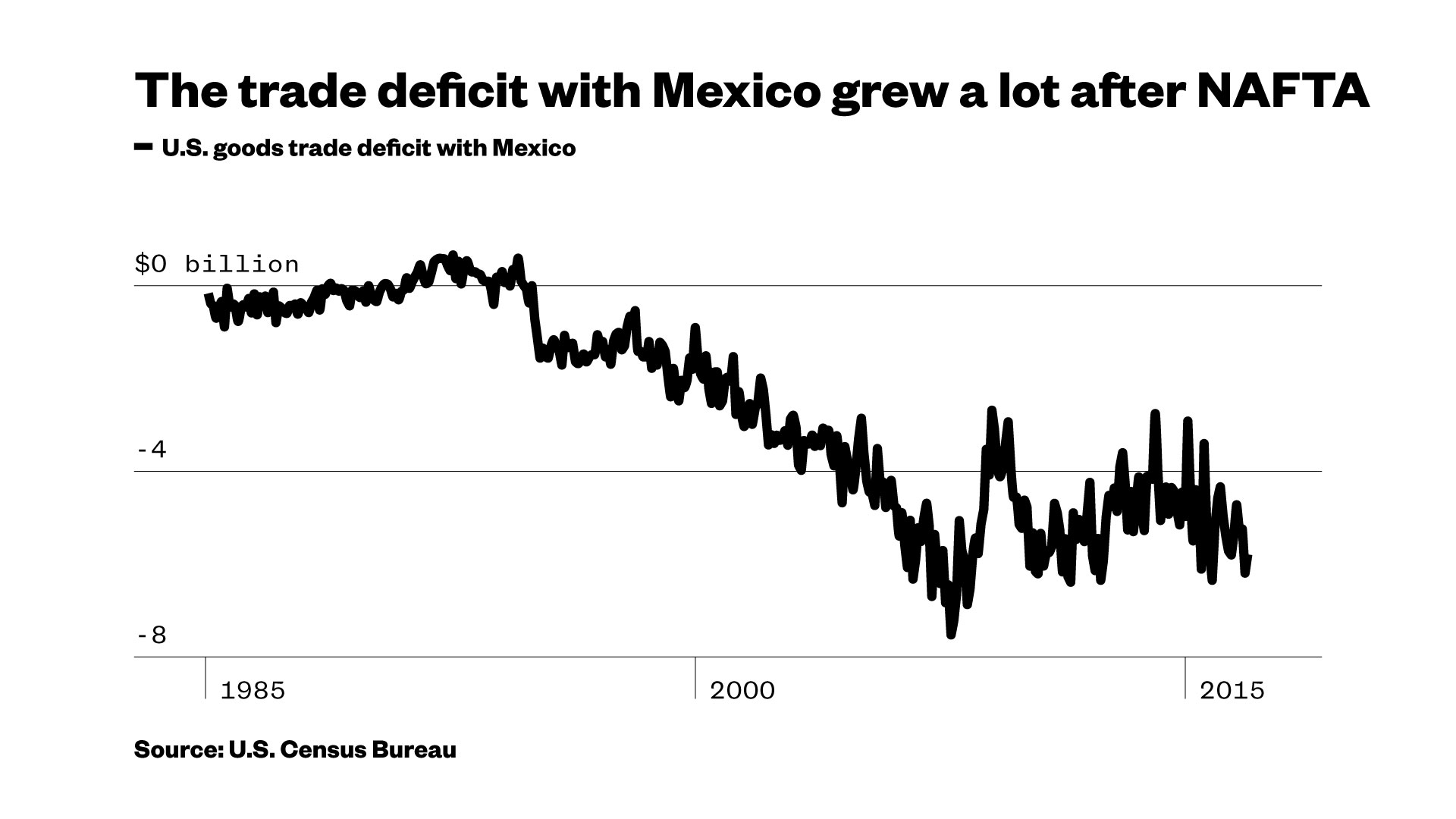If his goal was to blow up trade talks before they start, Donald Trump’s tweets Thursday morning — ahead of a planned meeting later this month with Mexican President Enrique Peña Nieto — couldn’t have been better designed.Perhaps Trump is merely trying to soften up the opposition before he gets down to business. (No one really knows.) But regardless of what you think of his tactics, it’s completely legitimate for the U.S. to rethink NAFTA.While there have been some benefits, free trade with Mexico has really hurt some American workers who don’t have college degrees, cutting manufacturing jobs and hitting wages in certain sectors.Trump didn’t have all his facts exactly right. The U.S. is on pace to run a $60 billion trade deficit in goods with Mexico this year. (Goods are things like soybeans, corn and cars, as opposed to services, like banking and air travel.) But since the U.S. runs a service surplus with the Mexico, the total deficit is probably more like $50 billion. But he was right that the goods trade deficit with Mexico has grown significantly since the U.S., Mexico, and Canada became a free trade bloc in 1994.That has hurt some American workers, especially people without college educations who once were able to make a middle-class living by working in factories and in specific sectors like textiles and footwear manufacturing.One solid estimate of the manufacturing jobs lost to Mexico after NAFTA looked at the years between 1993 and 2010, finding about 415,000 factory jobs were lost, many of those were from the U.S. automotive sector.Defenders of the deal say that many of those jobs would have been lost to other countries anyway. Moreover, they argue that by giving American companies access to lower-wage workers in Mexico, NAFTA enabled U.S. companies to remain competitive globally and may have actually have saved some manufacturing jobs in the U.S. And there are benefits for consumers, too, things like cheaper avocados.It should be said, overall the view is that the “welfare benefits” of the deal, by which economists mean gains to standards of living, have been very small. Autoworkers seem to see it that way, which helps explain Trump’s victory in auto-manufacturing centers such as Michigan. (Especially as Hillary Clinton’s husband was the one who signed the North American Free Trade Agreement into law.)But it’s important to put those job losses in context. Between 1993 and 2013, the U.S. lost roughly 5 million manufacturing jobs. The vast majority of those job losses were because of China, not Mexico. By comparison, roughly 2.1 million U.S. manufacturing jobs were lost to China between 2001 and 2011, according to an estimate from the left-leaning EPI.In other words, the U.S. has every right to a respectful, hard-nosed negotiation with Mexico over trade and immigration. But we need to bear in mind that the central source of the pain for U.S. manufacturing workers is China, not Mexico.And while, Trump hasn’t spared the Chinese any Twitter lashings, it’s hard to escape the sense that his focus on Mexico, a much smaller economy that’s highly dependent on the U.S., basically amounts to picking on the little guy.
But he was right that the goods trade deficit with Mexico has grown significantly since the U.S., Mexico, and Canada became a free trade bloc in 1994.That has hurt some American workers, especially people without college educations who once were able to make a middle-class living by working in factories and in specific sectors like textiles and footwear manufacturing.One solid estimate of the manufacturing jobs lost to Mexico after NAFTA looked at the years between 1993 and 2010, finding about 415,000 factory jobs were lost, many of those were from the U.S. automotive sector.Defenders of the deal say that many of those jobs would have been lost to other countries anyway. Moreover, they argue that by giving American companies access to lower-wage workers in Mexico, NAFTA enabled U.S. companies to remain competitive globally and may have actually have saved some manufacturing jobs in the U.S. And there are benefits for consumers, too, things like cheaper avocados.It should be said, overall the view is that the “welfare benefits” of the deal, by which economists mean gains to standards of living, have been very small. Autoworkers seem to see it that way, which helps explain Trump’s victory in auto-manufacturing centers such as Michigan. (Especially as Hillary Clinton’s husband was the one who signed the North American Free Trade Agreement into law.)But it’s important to put those job losses in context. Between 1993 and 2013, the U.S. lost roughly 5 million manufacturing jobs. The vast majority of those job losses were because of China, not Mexico. By comparison, roughly 2.1 million U.S. manufacturing jobs were lost to China between 2001 and 2011, according to an estimate from the left-leaning EPI.In other words, the U.S. has every right to a respectful, hard-nosed negotiation with Mexico over trade and immigration. But we need to bear in mind that the central source of the pain for U.S. manufacturing workers is China, not Mexico.And while, Trump hasn’t spared the Chinese any Twitter lashings, it’s hard to escape the sense that his focus on Mexico, a much smaller economy that’s highly dependent on the U.S., basically amounts to picking on the little guy.
Not surprisingly, Peña Nieto called the meeting off.“Given his recent provocations, Trump should be trying to smooth relations with Mexico rather than firing off yet another round of angry tweets,” said Edward Alden, a senior fellow at the Council on Foreign Relations who specializes on trade. “Sovereign nations simply will not accept this sort of treatment.”
Advertisement
